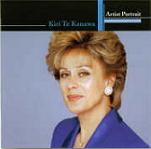With the exception of “Come scoglio” from Cosi, which comes from 1977, all of the selections here were recorded after 1990, arguably after the fullness, perfect sheen, and spring-like quality of Te Kanawa’s voice had begun to fade. Indeed, if you listen to “Come scoglio” you’ll be dazzled by the richness of each note in this show-offy, octave-leaping aria, from top B on down. The two Tannhäuser arias from 1990 are marvelous too, both energetic and subtle with fine shading. “Dich teure Halle” has great outgoing force and a nice quiet middle section, and Elisabeth’s last-act prayer is wonderfully inward.
I must admit that I always found Te Kanawa a beautiful voice machine with little intellect and generalized emotions, but by 1990, perhaps to go along with or compensate for a bit of fraying and a diminishing of volume and weight to the voice, she became a more interesting and analytical singer. Her “Un bel di” is a fine monologue, filled with childlike expectation; “Vissi d’arte” has a nice sense of urgency (while hardly comparing with a Callas or a Scotto interpretation). Both date from 1996. The three Christmas carols (from ’94) are a pleasure, with Te Kanawa using a sliver of voice for the “Coventry Carol”, a lovely, smooth legato for “There is no rose of such virtue”, and some heft for “The Virgin Mary had a Baby Boy”. Pieces from Rondine and Turandot (’96 also) seem a bit strained but are nicely conceived. Mimi’s “Addio” and the finale of Act 1 from La bohème (with Richard Leech) are perceptive and warm. About the four excerpts by Michel Legrand I’d rather say nothing than waste any opera lover’s time.
































